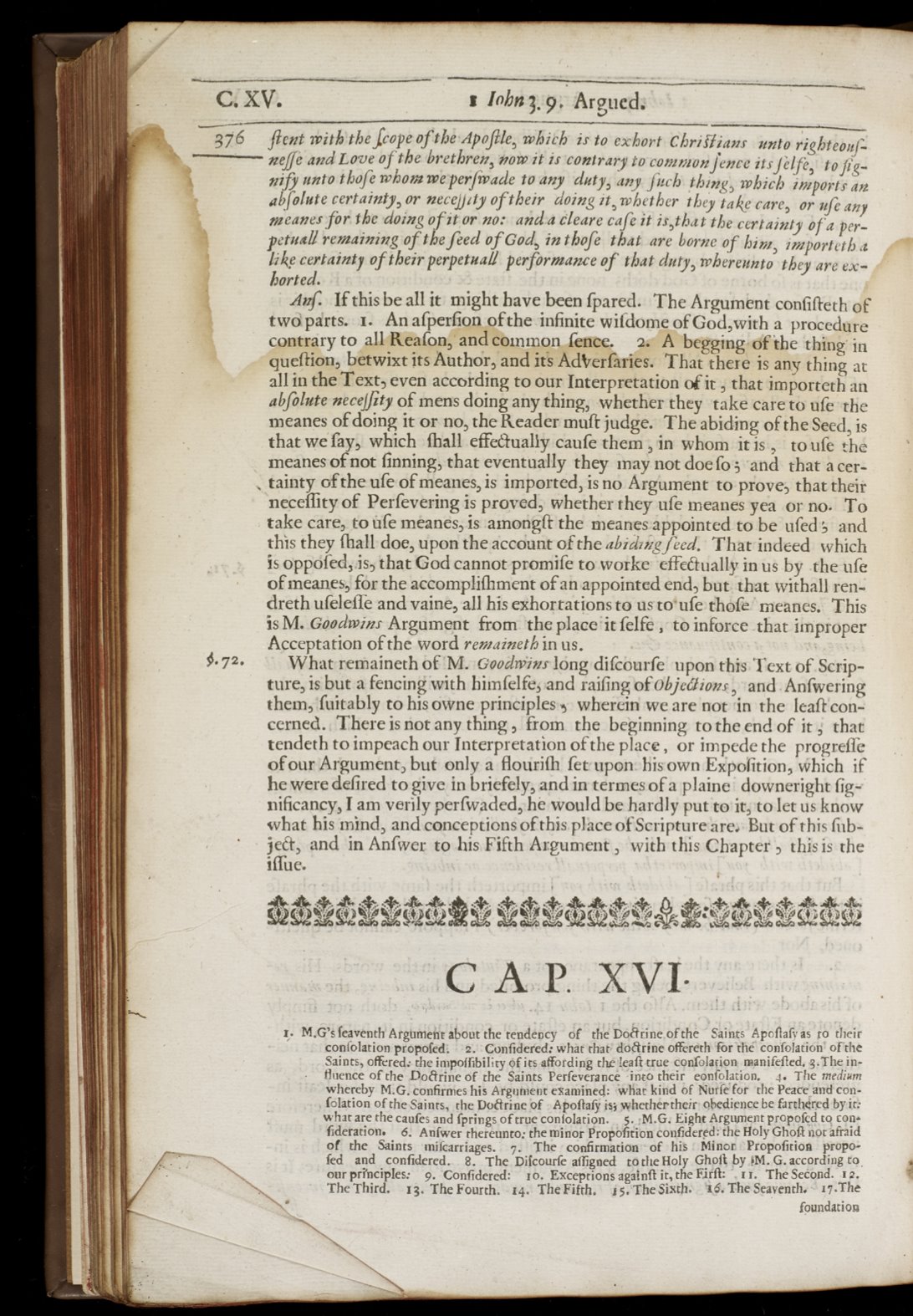

C.
XV.
t
lohn
3.9,
Argued.
376
silent
with
the
;ape
of
the
Apofile,
which is
to
exhort
Chrillians
unto righteous.
neffe
and
Love
of
the brethren,
now
it
is
contrary
to common
fence its
felfi,
to
fig
-
nify unto
thofe whom
we
perfwade
to any
duty,
any
filch
thing,
which imports
an
abfolute
certainty,
or
necef)ity
of
their
doing
it,
whether
they
take
care, or
oft
any
Measles
for
the
doing
of
it
or no:
and
a cleare cafe
it is,that
the
certainty
of
a
per-
petual) remaining
of
the
feed
of
God,
in
thofe
that
are
borne
of
him, import
eth a
like certainty
oftheir
perpetual) performance
of
that
duty,
whereunto
they
are
ex-
horted.
.Ant:
If
this
be all
it might
have
been fpared.
The
Argument
confifteth
of
two
parts.
s. An
afperfion
of
the
infinite
wifdome
of
God,with
a
procedure
contrary to
all Reafon, and common
fence.
2. A
begging
of
the thing
in
queftion, betwixt
its
Author, and
its Adberfaries.
That there
is
any
thing at
all in
the
Text,
even according
to
our Interpretation
of
it
,
that
importeth
an
abfolute
neceJfïty
of
mens doing any thing,
whether
they
take
care to
ufe
the
meanes
of
doing it
or
no, the
Reader
mutt judge.
The
abiding
of
the
Seed,
is
that
we
fay, which fhall effeetualiy caufe
them
, in
whom
it
is
,
to
ufe
the
meanes
of
not
finning,
that
eventually they
may
not doe
fo
and
that
a
cer-
tainty
of
the
ufe
of
meanes,
is
imported,
is
no Argument
to prove, that
their
neceffity
of
Perfevering
is
proved,
whether they
ufe meanes yea
or
no.
To
take
care,
to
ufe
meanes,
is
amongfi the
meanes
appointed to be
tiled;
and
this
they
(hall
doe, upon the account
of
the
abiding
feed.
That
indeed
which
is
oppofed,
is,
that
God cannot promife
to
worke
effectually
in us
by
the
ore
of
meanes, for
the accomplifhment
of
an
appointed end, but
that
withal!
ren-
dreth
ufeleffe
and vaine,
all his
exhortations to
us
to
ufe
thofe
meanes.
This
is
M.
Goodwin
Argument
from
the
place
it felfe
,
to
inforce
that
improper
Acceptation
of
the word
remaineth in us.
4.72.
What
remaineth
ofM.
Goodwin long difcourfe upon this
Text
of
Scrip-
ture,
is
but
a
fencing with himfelfe,
and
railing
of
objeaionc,
and Anfwering
them,
fuitably
to
his
owne principles
y
wherein
we
are not
in
the
leaft
con-
cerned.
There
is
not
any
thing
,
from the beginning to the
end
of
it
;
that
tendeth to
impeach our
Interpretation
of
the
place
,
or
impede the progreffe
of
our Argument, but
only
a
flourifh
fet
upon
his
own Expofition, which
if
he were
defired
to
give in briefely,
and
in
termes
of
a
plaine
downeright
fig-
nificancy, I am
verily
perfwaded, he would be hardly put to it,
to
let
us
know
what
his
mind, and conceptions
of
this place
of
Scripture are.
But
of
this
hub-
je
&,
and
in
Anfwer
to
his
Fifth
Argument,
with this
Chapter,
this
is
the
iffue.
Mitt
4)46
qÁ
C::n
gmt..:
At
Allia
w.m
c.a
...
C
A
P.
XVI-
4
A.A.
""S.t2aAt2
t.
M.G's feaventh Argument
about the tendency
of
the Dottrine
of
the
Saints
Apnfiafv
as
to their
confolation propofed.
a.
Confidered: what
that dottrine
offereth for
the confolation
of
Saints, offered: the impoffibility
of
its affording the leali true confolation
manifefled.
3.The in-
fluence
of
the
Dottrine
of
the Saints Perfeverance
into their
eonfolation. 4.
The
medium
whereby
M.G. confirmes his Argument examined:
what
kind of Nutfefor the Peace
and
con-
folation
of
the Saints, the
Dottrine of
Apoffafyis,
whether their
obedience
befarthercdbyit:
what
are the
castles
and fprings
of
true conlolation.
5..M.G.
EightArgument proposedto
con-
fideration.
6.
Anfwer thereunto: theminor
tropofitïon
confidered: the
Holy Ghobt
nor afraid
of
the Saints
mifcarriages. 7.
The
confirmation
of
his Minor Propofition propo-
fed
and confidered.
8.
The
Difcourfe afhgned
to
the
Holy
Gholt
by fM.G.
according to
our principles:
9.
Confidered:
ro.
Exceptions
againft
it, the
Eirfì:
II.
The
Second.
r
a.
The Third.
13.
The Fourth.
tg.
The Fifth.
15.
The
Sixth.
'16.
The
Seavenrh. 17.The
foundation










